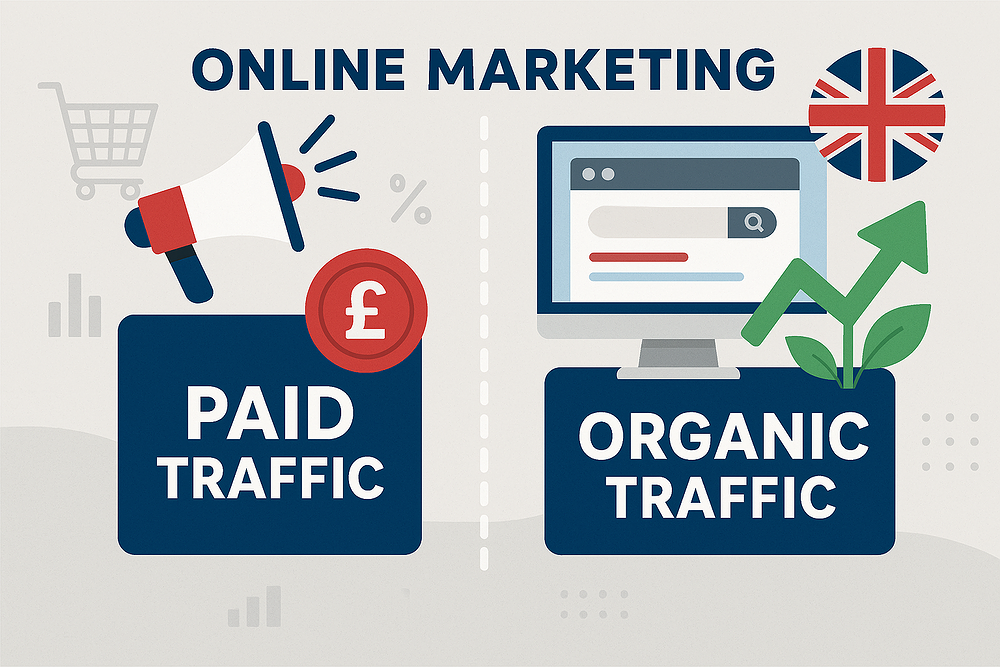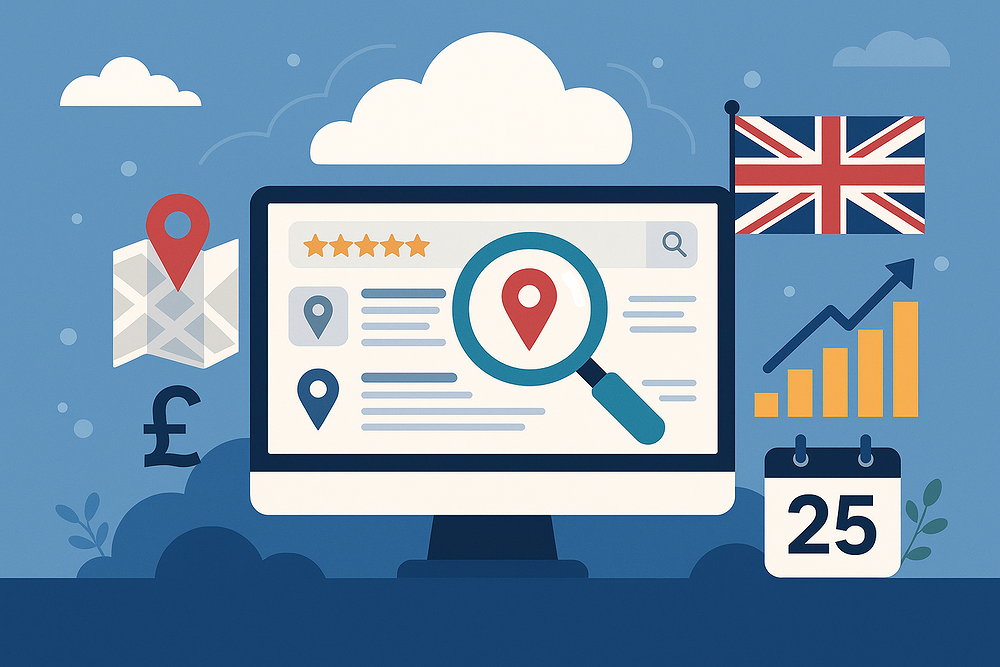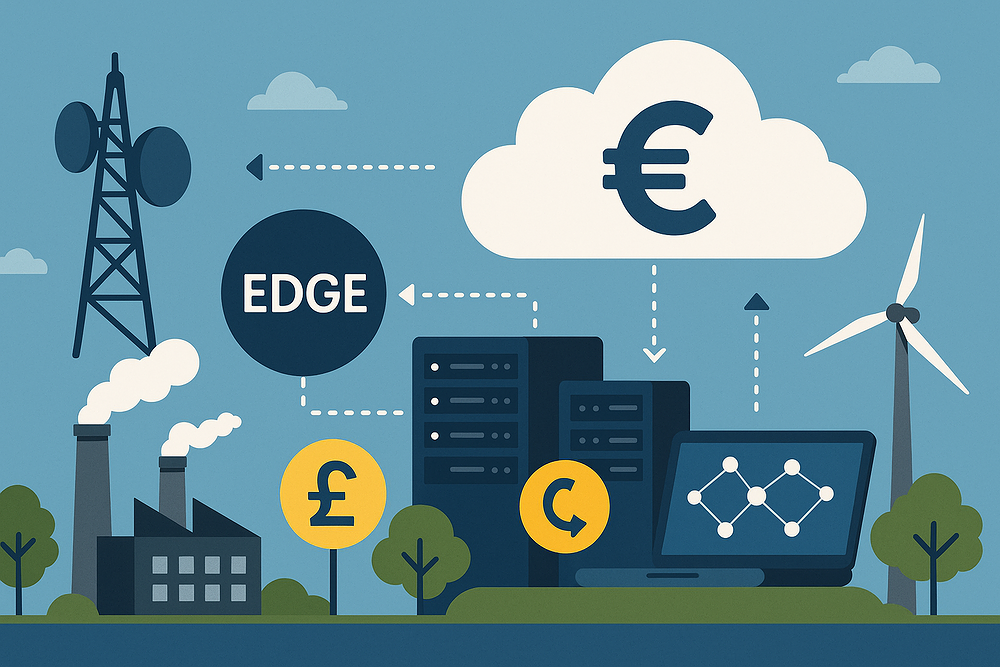Paid vs Organic Traffic: Where Should Your UK Business Invest?

In today's digital landscape, driving traffic to your website is essential for business growth. But with limited marketing budgets, UK businesses face a critical decision: should you invest in paid traffic, organic traffic, or perhaps a combination of both? This guide explores the pros and cons of each approach to help you make informed decisions about your online marketing strategy.
Understanding the Difference: Paid vs Organic Traffic
Before diving into which strategy might work best for your business, let's clarify what these terms mean.
Paid Traffic refers to visitors who come to your website through paid advertising channels. This includes pay-per-click (PPC) advertising on search engines like Google Ads, social media advertising on platforms like Facebook and LinkedIn, display ads, and sponsored content.
Organic Traffic consists of visitors who find your website through unpaid means. This typically includes people who discover your site through search engine results, social media posts, content marketing, or direct visits.
The Case for Paid Traffic
1. Immediate Results
The most compelling advantage of paid traffic is speed. When you launch a paid campaign, you can start seeing visitors arrive at your website almost immediately. For a new business or a time-sensitive promotion, this quick turnaround can be invaluable.
2. Precise Targeting
Modern advertising platforms offer remarkably detailed targeting options. You can direct your ads based on demographics, locations, interests, behaviours, and even the specific keywords people are searching for. This precision helps ensure your marketing budget is spent reaching the most relevant potential customers.
3. Predictable Scaling
With paid traffic, scaling up is straightforward: increase your budget, and you'll generally see a proportional increase in traffic. This predictability makes planning and forecasting easier.
4. Measurable Return on Investment
Digital advertising platforms provide comprehensive analytics, making it relatively simple to track exactly how much you're spending to acquire each customer. This clear line of sight to ROI helps you optimise campaigns and justify marketing expenditure.
5. Testing and Optimisation
Paid campaigns allow for rapid A/B testing of different messages, images, and offers. This means you can quickly learn what resonates with your audience and refine your approach accordingly.
The Downsides of Paid Traffic
However, paid traffic isn't without its challenges:
1. Ongoing Costs
The moment you stop paying, the traffic stops. There's no residual benefit once your campaign ends, which means you need a continuous budget to maintain results.
2. Increasing Competition
As more businesses invest in digital advertising, the cost per click in many sectors has steadily increased. Some competitive keywords in the UK can cost £30 or more per click.
3. Ad Fatigue and Blockers
Many users have developed "ad blindness" or use ad blockers, limiting the effectiveness of some paid strategies.
The Case for Organic Traffic
1. Long-term Value
While organic traffic takes longer to build, it tends to provide value over an extended period. A well-ranked page or blog post can continue driving traffic for years with minimal additional investment.
2. Higher Trust and Credibility
Studies consistently show that users trust organic search results more than advertisements. People tend to place more faith in content that ranks naturally for their query.
3. Better Conversion Rates
Organic visitors often convert at higher rates than paid traffic. They typically arrive with a problem to solve rather than being interrupted by an advertisement, making them more receptive to your solutions.
4. Compound Returns
Organic traffic strategies tend to build upon themselves. As you create more content and earn more backlinks, your site's overall authority increases, making it easier to rank for new terms in the future.
5. Wide-reaching Impact
Good SEO and content marketing can position your brand as an authority in your industry, providing benefits beyond just website traffic—including enhanced reputation and trust.
The Challenges of Organic Traffic
Organic traffic also has its limitations:
1. Time Investment
The biggest drawback is the time required. It typically takes 6-12 months to see significant results from SEO and content marketing efforts in the UK market.
2. Ongoing Work
Maintaining organic rankings requires consistent effort. Algorithm updates, changing user behaviour, and competitor activities all mean you can't simply "set and forget" your SEO strategy.
3. Less Predictable
Organic traffic can be more volatile and less predictable than paid campaigns. Algorithm updates can significantly impact rankings, sometimes overnight.
Finding the Right Balance for Your UK Business
So where should your business invest? The answer, as with many marketing questions, is: it depends. Here are some factors to consider:
Business Age and Goals
New Businesses often benefit from an initial focus on paid traffic to generate immediate results while simultaneously building organic foundations. Without some paid traffic, a new business might struggle to survive long enough to see organic efforts bear fruit.
Established Businesses may find more value in organic strategies, using paid traffic selectively for specific campaigns or to boost overall performance.
Industry and Competition
In highly competitive sectors like insurance or legal services, the cost of paid traffic can be prohibitive, making organic strategies more cost-effective in the long run. Conversely, in niche markets with lower competition, paid strategies might yield excellent ROI.
Customer Journey
Consider how your customers typically find and purchase your products or services. B2B companies with longer sales cycles often benefit more from content-driven organic approaches, while e-commerce businesses selling lower-cost items might see better results from targeted paid campaigns.
Budget Realities
Be realistic about what you can afford consistently. A modest, sustainable organic strategy is better than a paid campaign that depletes your budget in a month.
The Hybrid Approach: Often the Best Solution
For most UK businesses, a thoughtfully balanced hybrid approach yields the best results:
- Use paid traffic strategically – for product launches, seasonal promotions, or to target high-value keywords that are challenging to rank for organically.
- Build organic foundations systematically – create valuable content, optimise your site structure, and earn quality backlinks to generate sustained traffic over time.
- Let each channel inform the other – use insights from your paid campaigns (such as which keywords convert best) to guide your organic content strategy.
- Retarget organic visitors with paid ads – people who found you organically but didn't convert immediately can be brought back through retargeting ads.
- Adapt your balance over time – as your organic traffic grows, you might reduce paid spend in some areas while maintaining or increasing it in others.
Getting Started with a Balanced Strategy
If you're unsure where to begin, consider these steps:
- Audit your current traffic sources – understand what's already working and where you have gaps.
- Identify quick wins – look for opportunities where small investments could yield significant improvements.
- Set clear success metrics – define what constitutes success beyond just traffic numbers (conversions, leads, sales).
- Start small but consistently – better to do a few things well than many things poorly.
- Measure and adjust – regularly review performance data and be willing to pivot when necessary.
Conclusion
There's no one-size-fits-all answer to whether paid or organic traffic is better for UK businesses. The most successful companies recognise that these approaches complement rather than compete with each other.
By understanding the strengths and limitations of each strategy, you can develop a customised approach that maximises your marketing ROI while building sustainable traffic that supports your business goals both now and in the future.
Remember, the goal isn't just more traffic—it's the right traffic that connects with your offerings and converts into loyal customers.
Need help developing a custom traffic strategy for your UK business? Our team specialises in creating balanced digital marketing approaches that deliver measurable results. Contact us today to discuss how we can help grow your online presence.
Talk to us about your next project
Our team of experts is ready to help bring your ideas to life with solutions tailored to your business.
Get in Touch

